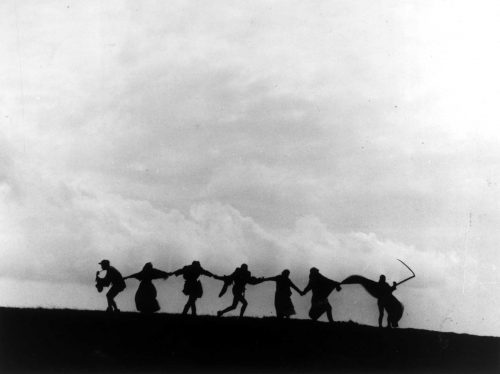BP’s Top 100 Challenge #31: The Seventh Seal, by Sarah Brinks
I decided to undertake a movie challenge in 2017. This seemed like a good way to see some classic movies that I have unfortunately never seen. The Battleship Pretension Top 100 list provided such a challenge.This was my second time watching The Seventh Seal and the fourth Ingmar Bergman film of the Battleship Pretension Top 100 list. I am a Bergman fan and I was happy to revisit The Seventh Seal. I enjoyed the film the first time I saw it but I didn’t remember a lot about it. I think I got a lot more out of the film this viewing.Of the four Bergman films on the list I would probably rank The Seventh Seal at the top as well but it would have a strong fight from Persona. Honestly it might depend on the day which one I like better. But I think that speaks to the strength of the stories that Bergman tells with his films. While none of them is light and airy, they never lack a sense of humor or moments of grace. Bergman makes films about life and death, humanity, and human interactions. Those are all things that everyone can relate to, and his films always feel like a meditation, like he is working out his own questions through his films.The Seventh Seal is a meditation on life and death and the balance that is struck between the two. We see a knight who has just returned the crusades and is playing a game of chess with death to attempt to get a little more time on this earth. He is also desperately trying to understand God, and if his efforts in the crusades were worth the horrors he saw and did and the time he lost to it. His squire seems to be struggling with similar questions but he is more interested in earthly pursuits than biblical ones. But I also like that we get to see Death as a person. Sometimes he is patient and fair sometimes he cruel and persistent. Death gives the knight time to play chess but he cuts the tree out from underneath the actor in order to take him when it is his time.The through line with the witch that they end up taking to be burned is another interesting angle. The young woman at one point tells the knight that the devil is in her eyes but he says that all he sees there is fear. In the end the knight, the squire, and the rest of their party cannot stay to watch that poor woman be burned alive.The character that I enjoyed the most this time was the squire played by Gunnar Bjӧrnstrand. He is the most honest of all the characters but is also funny and bawdy. I did take issue with him essentially kidnapping that farm girl and taking her along to be his new maid without a word from her, but it was also a different time back then. Max von Sydow is great as the knight. He has moments of severe doubt and fear but he is also kind to the traveling actors and their family, and he is clearly a man of deep faith. The other character I really liked was Jof, played by Nils Poppe. His visions add to the supernatural feeling of the film and his devotion to his family keep his story grounded. Bibi Anderson was in three of the four Bergman films on the list and I have enjoyed her performances in each film.I really like the ending of the film when Death finally shows up and each of the people present have their own reaction to seeing him. But none of them run or beg. They simply smile, or cry, or tell Death that they have done their best with their time on Earth. Jof has a vision of them dancing and being pulled along by Death so we know he has come for them but he has spared the actors and their child, making the ending both happy and sad. I like that Bergman doesn’t leave us with a completely sad or happy ending, but somewhere in between. That is a more fitting tone to match the rest of the film.I’ve decided to rate each film using an arbitrary scale based on the board game Battleship (lowest: Destroyer, Submarine, Cruiser, Battleship, highest: Carrier)The Seventh Seal ranking: Carrier































